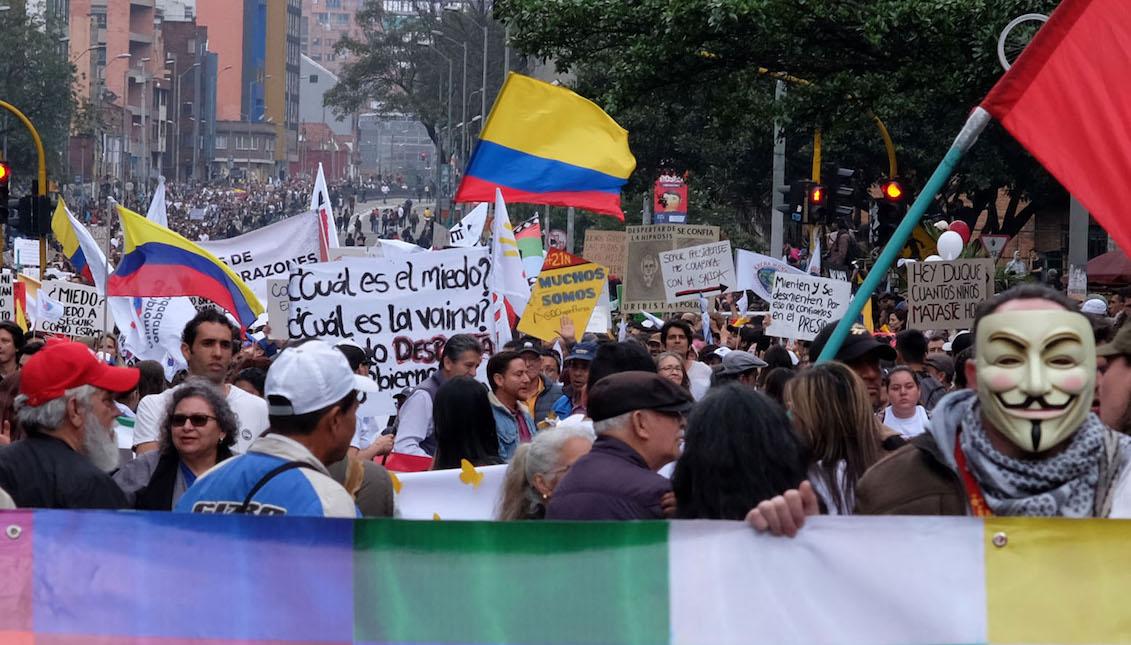RIO DE JANEIRO, BRAZIL – “‘Present, present, out with the president” chant thousands of Colombians in the streets of Bogotá to which they came out this Wednesday on the third day of a national strike called by labor centers and unions after their first meeting last Monday with the Government ended without agreement.

Hundreds of people with white T-shirts, balloons, musical instruments, and waving Colombian flags have arrived on the city’s main roads to participate in the call that advances festively despite the chaos and violence that have left 15 days of protests.
“The purpose of the strike that we have been carrying out since April 28 is to demand the national government negotiate the emergency plan that we submitted in June 2020 and guarantees social protest,” said Francisco Maltés, president of the Central Unitaria de Trabajadores (CUT).
Mobilizations took over the country two weeks ago, initially to protest against the already withdrawn tax reform presented by the government of President Iván Duque. Still, the non-conformist citizenry continues to cling to the streets as an act of protest with demands such as a stop to massacres and police abuse.
Today, the voices of the protesters carry other demands such as the posters with which they have gone out to demonstrate, using slogans like “No to the 010 (health) reform project” and “No to the pension or labor reform”.
After 15 days of pressure, Duque’s government has not only yielded in the withdrawal of the tax bill but, after failing to reach an agreement with the National Strike Committee, said it was willing to establish a permanent dialogue to reach consensus.
In addition, the president announced on Tuesday in Cali, the epicenter of the protests, that students of public universities and technical and technological institutions will not have to pay tuition for the second semester of this year.
According to Duque, who advocated this initiative should become a “public policy”, the measure “will allow 97% of the students of public universities, technical and technological institutions to have their tuition covered”.
AGAINST POLICE VIOLENCE
Gathered in the National Park of Bogotá, the protesters, some accompanied by their pets, have launched harangues against police brutality that represses the mobilizations and ask the Government for a negotiation contrary to the dialogues of the 2019 national strike; the agreements are fulfilled.
“I am in the strike because I believe that none of the reforms that have been made nor those that are planned in terms of labor, pension, health reform, favor the people,” said Marcela, one of the protesters.
She added that “we are living through a series of massacres, murders, simply for not having the right to protest when in reality what we are asking for is a guarantee for everything”.
The protester refers to the report on the 42 deaths that the Ombudsman’s Office has received from various organizations during the demonstrations. Many of them the result of violence in cities such as Cali, Pereira, and Ibagué and others for which the security forces have been held responsible.
Duque said Tuesday that authorities had initiated 65 disciplinary actions, including 8 for homicide, 27 for abuse of authority, 11 for physical aggression, and 19 for other conduct.
International organizations such as the UN, the European Union, and governments and protesters have asked the Duque administration to take action against police violence, punish those guilty of it, and guarantee the right to peaceful protest.
“A negotiation table should be generated, dialogues have been going on for a long time, and the Government has never fulfilled the agreements”, protested Marcela.
THE INDIGENOUS MARCH CONTINUES IN CALI
The indigenous minga (march) continues to congregate at the Universidad del Valle, in Cali, where it accompanies “the young people and the citizens mobilized because they were massacring us” to the leader of that community, Aida Quilcué.
In Cali, the capital of Valle del Cauca, violence has left most of the dead in the protests, and some blockades and confrontations continue, although with less intensity than during the first days of the mobilizations.
“We have fulfilled one of the objectives by arriving in Cali because it managed to minimize those repressive actions that at the time were, I feel that they have at least minimized the deaths,” added Quilcue about the minga, which will leave Cali today to support other points of concentration in the neighboring department of Cauca.

